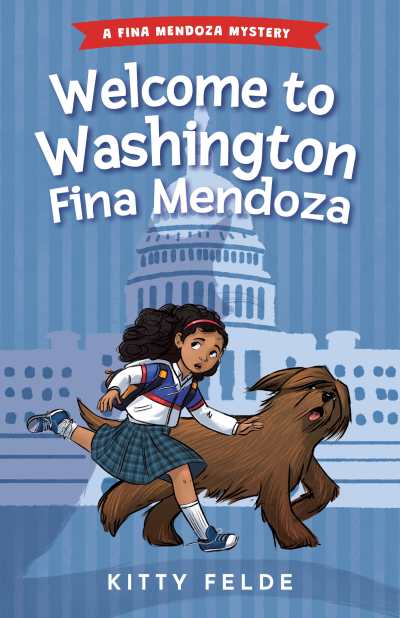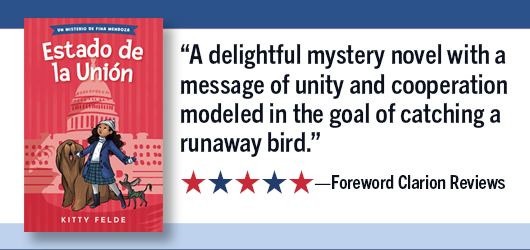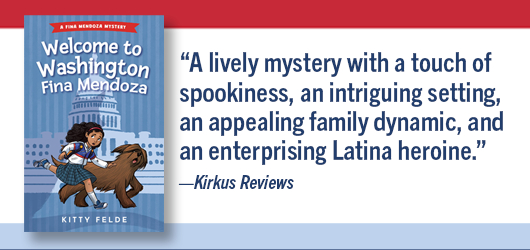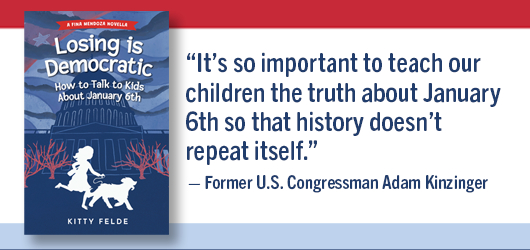Saving American Democracy One Kid at a Time

Reviewers Interview Kitty Felde, Author of The Fina Mendoza Mystery Series
Around every dinner table and public square in the US, the conversation of our times is surely about politics and the role of government. Imagine being left out of it because you don’t understand the issues or how American democracy works.
Sadly, studies show that to be exactly the case with a great majority of young Americans–and their parents. Experts realize this lack of civics understanding leads to increased estrangement from society—a slope that only gets more slippery through early adulthood.
Enter Kitty Felde, a veteran public radio journalist with extensive experience reporting from Washington DC, who realized she was uniquely qualified to make a difference in civics education for kids. Her Fina Mendoza series of mysteries includes two acclaimed titles—Welcome to Washington Fina Mendoza and State of the Union—with a third, Snake in the Grass, set for release in the spring of 2025. Additionally, she wrote Losing is Democratic: How to Talk to Kids about January 6th, another engaging project to help kids better understand complicated political events.
The Fina Mendoza mysteries earned stellar Clarion reviews from both Aimee Jodoin and Sterling Hooker, who tipped us off to Kitty’s important work. Hoping to learn more, we put the three together for the following conversation. Foreword’s Executive Editor Matt Sutherland joins at the end.
Questions about State of the Union, by Clarion reviewer Aimee Jodoin:
Before writing the Fina Mendoza mysteries, you had a long and successful career as a public radio journalist reporting on politics and government. Why did you pursue radio and politics as a career? What inspired the transition to writing for children?
Radio journalism was an accident. I was a theatre major and imagined that I was headed to Broadway. Instead, I filmed Skippy Peanut Butter commercials with Annette Funicello and posed for very politically incorrect print ads for Virginia Slims, where I was the old fashioned girl who got caught smoking.
I’m also a major baseball fan and my local Dodger radio station ran a contest looking for a female voice to add to their sports talk show. I was a finalist. I didn’t win, but figured I could perhaps get a job in radio if I actually knew what I was doing.
I started volunteering at my local public radio station, eventually getting hired to produce sports features. I discovered that there were few women covering athletics. I was banned from locker rooms. I attended basketball press conferences where there were barrels of cold beer and Laker Girls wearing their shortest skirts. Every interview, you had to get past the spoken and unspoken message of “what are you doing here?”
And then one day in the newsroom, we got news of a brushfire and I happened to know the neighborhood on fire. I discovered that there was no “what are you doing here?” attitude from firefighters and cops. Other women had broken the glass ceiling before me. I switched from sports to general assignment and covered everything from immigration to earthquakes. I covered major trials—the cops involved in the Rodney King beating, the OJ Simpson murder case, international war crimes trials. I hosted a talk show for nearly a decade.
But I also covered government: city council and county supervisors meetings. I moderated political candidate debates, created a series of specials for PBS on ballot propositions, trailed around with candidates who were knocking on voter’s doors. Finally, I convinced the radio station to send me to Washington to cover all the California-related stories missing from our air. I got to see government and politics up close.
During my theatre days, I wrote dozens of plays, but had never tackled prose. I’d always wanted to write for kids. I’d been a member of SCBWI, the Society for Children’s Book Writers and Illustrators, for decades, but just didn’t have the courage to write for kids. Until Fina.
I saw a genuine need for basic civics education, and the need to make it interesting and personal to younger readers. I knew from my theatre background that we human beings love a good story. So I created the daughter of a congressman who solves mysteries and sneaks in lessons about government.
Are there any particular stories from your time in journalism reporting on Capitol Hill that informed your storytelling in the Fina Mendoza books?
My favorite event of the year on Capitol Hill is the night the president comes to the US Capitol to deliver the State of the Union address. It’s so full of pomp and circumstance: the parade of cabinet members and Supreme Court justices who join all of Congress crowded onto the House floor; the special guest each member gets to invite to sit up in the gallery and talk to reporters about gun control or research funding (whatever particular topic is important to the member); the politicos who line the aisle hoping to shake the president’s hand (a seat they had to stake out early that morning); watching the speech itself (counting applause lines, sudden outbursts, anything off-script); covering the tradition of the rebuttal speech in English and Spanish; and finally, the chaos and madness of Statuary Hall, where politicos give their own spin on the speech to hundreds of reporters and dozens of cameras.
I knew I had to capture that political circus for kids. It became the second book in the Fina Mendoza Mysteries, State of the Union,–or Estado de la Unión in the Spanish version.
I was surprised when I arrived on Capitol Hill to see all the dogs in members’ offices. There was Fred the beagle and Bruin the bulldog. It was one thing Democrats and Republicans alike agreed upon: dogs! Fina needed a Dr. Watson. And because she was a fish out of water—the new kid in class—I decided that a big orange dog, a French Briard who belonged to a GOP lawmaker from Georgia, could play that role. Fina gets an afterschool job walking congressional dogs and Senator Something is her first client. (His owner wanted to name him after her favorite senator, but she couldn’t decide which one she liked best and her staff had to call the dog something, and the name stuck.)
I also met the kids of members of Congress—on swearing-in day, at the Capitol Christmas Tree ceremony, and trailing after their mom or dad in the tunnels under the Capitol. Most members leave DC on Thursday afternoons and return Monday night, filling their weekends with constituent events. Kids rarely see their political parent. But a few live full-time on Capitol Hill. I wanted Fina—California kid whose dad was rarely available—to have that DC experience of living with him full time. Of course, she discovers that he’s still rarely available. Sigh.
Fina’s deductive powers and keen observations are at the center of her story. How did you decide to have Fina be a kid detective?
Mysteries are a wonderful fiction device, propelling the action, dropping clues to keep the reader interested in what happens next, delivering a satisfactory ending to a story. So I decided that Fina would have to be a detective.
Detectives are snoopy. They ask impolite questions. They stick their noses where they don’t belong. Fina’s Family Pass lets her explore beyond what normal tourists get to see in Washington and a congressman father exposes her to situations and people most of us will never experience.
(Now that I think of it, observational skills and deductive powers are key to being a journalist. You pay attention. So maybe that’s what a journalist is, really: a detective.)
I love that Fina’s internet investigations into the Chickcharney model for children how to safely and effectively learn about topics they care about. How can kids stay informed (and solve their own exciting mysteries!) in an environment where misleading information, information suppression, and “fake news” run rampant?
Librarians, librarians, librarians! They are our superheroes. They can help us research almost anything, introduce us to resources we never knew existed! Librarians are on the front line of media literacy, teaching kids how to discern the true from the fake. They can find exactly the book we need at the moment, with a character we will consider a “kindred spirit” the rest of our lives. They can connect us to our community, help us pass a citizenship exam, even teach us how to use a 3D printer. It breaks my heart to go into a local library empty of children. It was my refuge as a child.
I am also deeply concerned about the perceived death of local journalism. Real news. I like the models where local papers tap journalism students to fill the ranks of reporters. But what happens when they graduate? Where are the jobs? I hope someone smarter than me comes up with a solution.
Fina’s father and abuelita may have similar political views, but they have different ways of expressing them and fighting for change. As a congressman, Papa works within the system to enact change but often relents under oppositional pressure, which frustrates his mother; Abuelita, meanwhile, takes to the streets with picket signs, risking legal consequences, which frightens and angers her son. Do you have any advice for children whose family members have political disagreements?
Talk about it. This election is the perfect moment. It might be years before they can cast a ballot themselves, but it’s never too early to become an informed citizen.
Have the child think about the specific issues that are important to them. When I visit classrooms, I have kids write pre-stamped postcards to their member of Congress about one particular issue. Some kids write about homelessness, others immigration or traffic safety, and of course, one goofball suggests that they change the law to five days of weekend and two of school. The most moving was the kid who asked Congress to change the Constitution so that he could run for president: he had been born in South Korea.
Kids can ask their parents where their favorite candidate stands on the child’s particular issue. It’s a great chance to do some research and discuss candidates without emotion.
Or you could start with the easy stuff: talk about ballot propositions. The voters guide not only offers the pros and cons, but also who’s funding the measure. Ask the child what that tells you.
Back when I had my radio talk show, we did a segment where we went out to high schools and had AP Government students quiz the local politicos. They asked much harder questions than any journalist I know. Be prepared for lots of questions.
Encouraging kids to talk to their parents about this election may not completely erase the nastiness and bitter partisanship we currently are experiencing, but it’s a start.
Despite the political tension in the novel, State of the Union is ultimately a story of optimism and unity. What gives you hope in complicated political times?
I’m afraid that I was born optimistic. Working on Capitol Hill did not turn me into a cynic. Most of the people I met in Congress—from either party—came to Washington to work for positive change. They wanted to make a difference in the world. They just forgot how to disagree.
I want Fina to be a role model, someone who (in book 3, Snake in the Grass) challenges the Speaker of the House on a new policy forbidding Democrats from walking Republican dogs. “I can’t help it if my father’s a Democrat and Senator Something can’t help it if his owner is a Republican,” says Fina. “I know Democrats and Republicans fight all the time, but I’m not even old enough to vote. And Senator Something can’t vote either because they don’t let dogs vote.”
Kids are born optimistic. Their passion and joy can hopefully trickle upstream to the adults.
Questions about Welcome to Washington, Fina Mendoza, by Clarion reviewer Sterling Hooker:
In the book’s back materials, you mention that you have a classroom guide for Welcome to Washington, Fina Mendoza, and your work in radio continues on in the form of your podcast, Book Club for Kids. How do you feel podcasts, radio, and digital news can help shape young people’s education, both inside and outside the classroom?
Kids are in the classroom for so many hours of their day. Teachers are under tons of pressure to cover so much material AND make sure kids do well on tests. I’ve tried to make my Fina Mendoza Mysteries series useful, incorporating a variety of subjects—math, SEL, language arts, and social studies that teachers can use throughout the school day.
But there are so many accidental opportunities for learning outside the classroom.
–Sitting in the backseat of mom or dad’s carpool is the perfect time to listen to an educational podcast designed for kids (there are DOZENS these days, including The Fina Mendoza Mysteries or Book Club for Kids.)
-–News for kids isn’t that hard to find. NBC still offers its Nightly News for Kids every Thursday afternoon for free on YouTube. The Week magazine has a terrific version for kids. So does Time.
–I learned to read at the breakfast table, deciphering cereal boxes. Make that gathering place a place to read, not stare at one’s phone. Plant reading material near the juice jug.
–Be seen reading yourself. Or declare a fifteen minute reading zone.
–Listen to a five minute newscast together. Encourage a child to ask questions. If interested in a topic, help them find out more.
–Take your child with you to vote—or at least, watch you fill out your ballot and drop it off. Don’t assume that they won’t be interested.
Working and reporting in Washington, DC—a city that holds so much historical importance for the United States—there must be a lot of inspiring stories that run through the Capitol buildings and National Mall. You mention that you too were looking for the Demon Cat! How has the city’s history inspired what you show in Fina’s stories, and did this influence your decision to write her as a detective, solving mysteries?
As a reporter, I loved finding the odd histories and mysteries that were not “news” but told so much about a place and time. I tucked them in the back of my brain and now get the chance to use them with Fina. I’m currently working on an adult mystery with Theodore Roosevelt’s outspoken daughter Alice as the protagonist and I’ve been learning tons about Washington in the early 1900s. DC is such a rich source of story material!
Fina Mendoza has a background not many middle-grade book’s protagonists have. She is Latina, attends St. Philip’s (inferred to be a Catholic school), and is being raised by a newly single parent with the help of her older sister and grandmother. She is strong, caring, and curious—all the makings of a great heroine. From where did you draw inspiration for Fina?
A few years ago, I was invited to mentor a young woman named Fina. On her first day of high school, the original Fina realized that the quality of education at that school was lousy and she concluded that she’d never get to college from there. She convinced her mother—who spoke no English—to jump through all the hoops necessary to get her transferred to a better high school. Today, the original Fina teaches full time, has already earned her master’s degree, and is back in college weekends and nights, with the goal of becoming a school principal.
I never knew that Fina as a ten-year-old, but I could imagine her: determined, quiet, wicked smart. I asked her whether I could borrow her name and she agreed.
There’s a lot of major experiences during Fina’s first few weeks in Washington DC: from the goings-on at Capitol Hill and her first job, to childhood independence, emotional maturity, and responsibility. How did you decide the major themes you wanted Fina to experience in your series opener, and why do you think these are important for your target audience to read about?
For writers, sometimes you plan things and sometimes things plan you.
I didn’t realize until Welcome to Washington Fina Mendoza came out that I was writing about the loss of my own mother. That’s the work of the subconscious, screaming at us to pay attention to something.
As to conscious planning, I knew that I wanted to divide the timeline into seasons, book 1 set in the fall, 2 in winter, etc. That allowed me to include important emotional and political touchstones in Fina’s life. I knew I wanted to cover the State of the Union, political protests, the Congressional Charity Baseball Game, political fundraising, etc.
I also knew that Fina needed an arc—even in the first book. She starts as that fish out of water and learns confidence along the way. The challenge is to have your protagonist continue on that path of growth through books two to five.
Throughout the book, there are subtle lines about Fina’s father’s work. As a congressman, he has a history with labor unions and works with politicians—both in his own party and in opposing ones—to pass bills. He calls a lot of people for support, and has to take many calls to keep up-to-date on his work, often conflicting with his personal life. What do you hope young readers will realize about our real-life politicians from seeing the professional and personal life of a fictional one?
Politicians continuously rank at the bottom in polls of trustworthiness. I think that’s a real shame. Even though Papa—and most people with stressful careers—is distracted and busy, he’s not a bad man. We like him.
When I was covering Congress, I liked nearly all of the people I encountered there. These were people with a purpose. Even if I disagreed with that purpose personally, I admired them.
I want young people to see these politicos as human beings, not monsters. I want them to look behind the headlines and the screaming and see real people trying to make America a better place. I want some of them to be inspired to seek public service themselves some day. Perhaps, like Fina, they do not want to run for office themselves, but want to have a voice in our democracy, to serve on juries, vote every election, even march with a picket sign if they are so inspired.
Foreword’s Executive Editor Matt Sutherland:
Aside from your Fina Mendoza Mystery series, you’ve written an educational novella, Losing is Democratic: How to Talk to Kids About January 6th. What are some of the lessons from that attack on the US Capitol and why do you think a devoted primer might be needed for kids?
We’d like to shield kids from the harsher realities in the news and in our lives. But they see it anyway. And we shy away from talking about it.
But how do we talk about it without scaring them to death?
I watched January 6th unfold live on TV from my home in California. I knew every hallway and room where the mob was spreading. It was my office. And I wanted to do something.
I thought about all the kids on Capitol Hill whose parents worked in that building, just like Fina. I contacted teachers on Capitol Hill and asked them how they were tackling the topic in the classroom. Their answers inspired me to write the novella.
In Losing is Democratic: How to Talk to Kids About January 6th, Fina’s teacher talks about history—how angry John Adams was when he lost to Thomas Jefferson and how it was letters between the two that (at least partially) healed the breach. Fina’s class also tackles the topic of losing itself: how it’s important not only in reading contests, but also in baseball, and in democracy.
Would you mind sharing your thoughts on the upcoming presidential election?
I admit, I am worried about post-election violence. But that said, I believe that there are so many opportunities in this election to turn it into a civics lesson. What’s an electoral college? Why do we have conventions? Why do different states have different voting laws?
Have kids critique the plethora of election ads. Listen to the music and the voiceover and the image and the quotes. What is the ad trying to tell us? Does it succeed?
I’ve been volunteering as a poll worker. During the primary, I was on the USC campus. It was astounding to me how little these college students knew about civics. One girl burst into tears, saying nobody told her that there was a primary that day and she didn’t know anybody on the ballot and she hadn’t registered to vote. I assured her that nobody was going to test her on her knowledge and that in California, she could register that very day and that she didn’t have to vote for every item on the ballot. She became a first-time voter.
So I say to all parents: talk to your kids about the election—not just the candidates, but about the mechanism of democracy. Does it work? Is there a better way to do it?
And take your kid to volunteer for something—a school board race, a ballot proposition, a candidate. They can lick envelopes and go with you to knock on doors and watch you vote. They can stay up late on election night and watch Steve Kornacki and his magic board. Consider it training wheels for voters!
And finally, what’s next for Fina Mendoza and your talented pen?
Next spring, we tackle the bitter partisanship on Capitol Hill in book 3 in the Fina Mendoza Mysteries. It’s called Snake in the Grass and looks at the annual charity baseball game where Democrats play Republicans. Meanwhile, somebody’s putting snakes in the gym bags and trash cans of lawmakers who dare to talk to a lawmaker on the other side of the aisle.
I’m currently writing book 4, Home of the Brave, where the Mendoza family returns to Los Angeles for the summer and we get to see how federal and local governments interact on issues like homelessness and veteran’s care while Fina is trying to find out who is knocking over trash cans in her old neighborhood. (Hint: it’s an animal!)
Welcome to Washington Fina Mendoza
A Fina Mendoza Mystery
Chesapeake Press (Jul 3, 2023)
Clarion Rating: 4 out of 5
A grieving girl stumbles onto a supernatural distraction in the involving mystery novel Welcome to Washington Fina Mendoza.
In Kitty Felde’s series-opening mystery novel Welcome to Washington Fina Mendoza, a girl whose father works in the government has an insider’s glimpse at Washington, DC, goings-on.

After moving from Los Angeles to Washington, DC, because of her father’s position as a congressman, Fina is at odds with her new surroundings. She misplaces her sweatshirt, struggles to make friends, and misses her life back in California, a place that holds strong memories of her late mother.
While looking for her sweatshirt, Fina hears mysterious noises in the Capitol Crypt. A policewoman tells her that it is the curse of the Demon Cat, and that bad luck comes upon those who encounter the crypt. Soon after, Fina’s abuelita breaks her leg, Fina drops a spaghetti sauce jar, and Senator Something, the dog Fina walks for a congresswoman, runs into the street and is hit by a car. Convinced that all of her bad luck is happening because of the Demon Cat, Fina sets out to solve the mystery.
The book’s adults behave in sometimes childish ways, resulting in awkward dynamics: the policewoman blames Fina when Senator Something chews up an item; Fina’s father is waiting for Abuelita to unpack their boxes, prompting Fina and her sister Gabby to unpack by themselves; and when Senator Something is hit by a car, Fina guides an office worker to save the dog’s life. In comparison, Fina is developed as a strong, thoughtful girl who’s reminiscent of her mother. Her tenuous relationship with her sister is both argumentative and caring—reflecting their loving bond despite their large age gap.
While at first the Demon Cat mystery crowds out other concerns in Fina’s mind, including those related to her missing sweatshirt, her new life in Washington, DC, and her family’s grief, the separate storylines marry quite well by the novel’s midpoint. Indeed, Fina’s determination to solve the mystery is tied to her hope to protect her family (in particular, her father) from the curse: she fears losing another family member. In her dedicated efforts to solve the Demon Cat mystery, Fina also ends up addressing her complicated feelings of grief, love, and the desire to make her mother proud. These concerns lead to a satisfying and emotional resolution that addresses Fina’s fears, Gabby’s issues with the move, and their father’s increasing understanding that he needs to be more present in their lives.
With captivating family dynamics and a smart, courageous heroine, the lighthearted mystery novel Welcome to Washington Fina Mendoza encompasses the struggles of loss, moving, and independence.
Reviewed by Sterling Hooker
State of the Union
A Fina Mendoza Mystery
Chesapeake Press (Aug 13, 2021)
Clarion Rating: 5 out of 5
“Sometimes you have to do things that make other people mad if you want to change something that is wrong,” learns a precocious young investigator in the involving mystery novel State of the Union.
In Kitty Felde’s informative mystery novel State of the Union, a child detective tracks down a rogue bird that she believes may have a message for her from beyond.
Ten-year-old Fina spends a lot of time in the US Capitol. Her father works in the House of Representatives, and she works as a dog walker for the pets of members of Congress.

When Monica, the woman who works at the Capitol’s cafeteria checkout, tells Fina that she keeps hearing the squawk of a Chickcharney, a legendary bird from her home in the Caribbean, Fina is skeptical. But when a bird swoops in and poops on the president’s head during the State of the Union address, Fina is convinced that what Monica said is true: the Chickcharney is here, and it has a message for her from her late mother. Though Fina’s investigation lands her in trouble with the Capitol Hill security guards and complicates her relationship with her father and her abuelita, she races to find the bird before animal control can take it away.
Fina is an intelligent and precocious heroine who uses her critical thinking skills and keen observational senses to suss out information on the Chickcharney and the other mysteries in her daily life, including her inscrutable math homework and her teenage sister’s angst-motivated choices. Fina attributes her humility to the example of her Mexican American abuelita, who is a proud pro-immigration activist; she knows she is lucky to live in close proximity to the White House too. In the course of the novel, she shares insider information such as that “reporters don’t applaud” and that it is “against the rules to use a government phone or a government office to help you run for re-election.” Her affable voice and desire to do her best make her an endearing guide through the capital city.
Fina’s investigation takes place on the internet as much as on the Capitol’s grounds, but her alternating disappointment and excitement at her dead ends and discoveries make her digital search just as action-packed as her physical one. Encounters with cantankerous Capitol police and listless reporters bolster the book’s suspense. While Fina seems to lack friends her own age without explanation, her dog-walking companions and her abuelita, who has high expectations for her kin, round out her extra-detective activities. And her abuelita’s and father’s political motivations interweave with Fina’s investigation for additional intrigue.
In the process of searching for the Chickcharney, Fina lands on another message from her abuelita’s activist friends: “Sometimes you have to do things that make other people mad if you want to change something that is wrong.” While Fina’s goal is always to find the Chickcharney, her understanding of its potential message shifts over the course of her investigation. In the political battle over whether the bird that pooped on the president’s head during the State of the Union speech should be killed or lauded, Fina only wants for it what she wants for herself: a sense of belonging.
State of the Union is a delightful mystery novel with a message of unity and cooperation modeled in the goal of catching a runaway bird.
Reviewed by Aimee Jodoin
Aimee Jodoin



